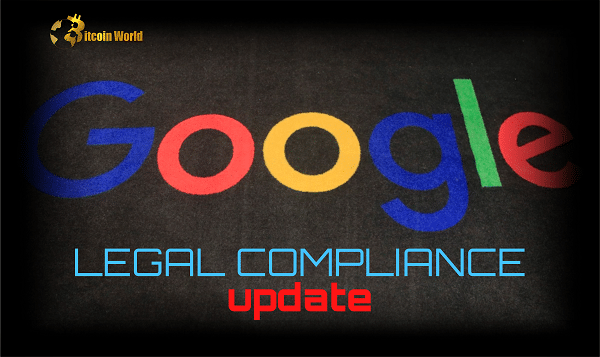In the ever-evolving world of cryptocurrency and digital assets, even tech giants like Google aren’t immune to regulatory scrutiny. Remember BTC-e, the now-defunct crypto exchange that once handled billions? Back in 2016, Google found itself in hot water when it couldn’t cough up information related to BTC-e for the U.S. Department of Justice (DOJ). Fast forward to today, and Google, under its parent company Alphabet Inc., has struck a first-of-its-kind settlement with the DOJ, promising to seriously level up its legal compliance game. What does this mean for the future of crypto data and Google’s role in it? Let’s dive in.
Why Did the DOJ Come Knocking on Google’s Door?
It all boils down to a 2016 request from the DOJ for information about BTC-e, a cryptocurrency exchange that the FBI later shut down in 2017 for alleged money laundering. Between 2011 and its closure, BTC-e reportedly processed a staggering US$9 billion. The DOJ needed Google’s help in their investigation, but Google, well, didn’t fully comply at the time.
According to the DOJ’s official statement, the settlement agreement means Google is committing to “reform and strengthen its legal process compliance program.” Essentially, they’re promising to be much better at responding to legal requests – like subpoenas and search warrants – from judicial authorities. This isn’t just a slap on the wrist; it’s a significant step towards ensuring tech companies, even global giants, are accountable.
What Exactly Does Google Need to Do Now?
This isn’t just a pinky promise situation. The DOJ is making sure Google walks the talk. Here’s what the settlement entails:
- Independent Oversight: An independent, third-party compliance professional will be appointed to keep a close eye on Google’s progress. Think of it as a dedicated watchdog ensuring Google stays on the straight and narrow.
- Regular Reporting: Google isn’t just left to its own devices. The company is obligated to submit reports to the government every six months. This ensures continuous monitoring of their compliance improvements and keeps them accountable over time.
These measures are designed to build trust and ensure that when legal authorities come calling, Google is ready to provide timely and comprehensive responses. It’s about building a robust system for legal compliance, not just reacting to individual requests.
The CLOUD Act: Changing the Landscape of Data Access
Google’s initial resistance to the 2016 DOJ request stemmed from a legal argument about data location. They argued that search warrants were only applicable to data physically located on U.S. soil. Given Google’s vast global infrastructure, pinpointing exactly which data was necessary and where it resided became a point of contention.
However, the legal landscape shifted with the CLOUD Act, passed in 2018. This legislation clarified that U.S.-based tech companies must provide requested data, regardless of where it’s stored globally. The CLOUD Act essentially removed the geographical limitations that Google initially leaned on.
Adding another layer of complexity, Google later admitted that some of the requested BTC-e data had already been deleted. This highlights the challenges of data retention and retrieval in the fast-paced digital world, especially when legal processes lag behind technological advancements.
Why is This Settlement Important for the Crypto World?
This settlement isn’t just about Google and a past data request. It has wider implications for the cryptocurrency industry and how legal authorities approach digital asset data:
- Precedent Setting: This is a landmark settlement, the first of its kind for Google regarding legal process compliance. It sets a precedent for how tech companies, particularly those involved in or interacting with the crypto space, will be expected to respond to legal requests in the future.
- Increased Scrutiny: As crypto adoption grows, so will regulatory scrutiny. This settlement signals that governments are serious about accessing data related to cryptocurrency activities when necessary for investigations and law enforcement.
- Data Transparency: For the crypto industry to mature and gain wider acceptance, transparency and cooperation with legal frameworks are crucial. Google’s commitment to improved compliance can be seen as a step towards greater data transparency in the digital asset ecosystem.
- Impact on Google Cloud & Crypto: Google Cloud is increasingly becoming a player in the crypto infrastructure space. This settlement underscores the importance of robust legal compliance for Google as it continues to engage with the cryptocurrency sector. It assures both regulators and users that Google is taking data security and legal obligations seriously.
Google’s Financial Picture: A Quick Glance
While the legal settlement is a significant development, it’s also worth noting Google’s recent financial performance. Despite reporting a massive US$69 billion in revenue for the quarter, Google’s Q3 earnings fell short of forecasts. Competition from platforms like TikTok is cited as a contributing factor, and Google’s shares saw a 5% dip in after-hours trading.
While seemingly unrelated, Google’s financial performance and legal obligations are intertwined. Maintaining user trust, complying with regulations, and navigating the evolving digital landscape are all crucial for long-term success, especially in a dynamic market like cryptocurrency.
Looking Ahead: Crypto, Compliance, and Big Tech
Google’s settlement with the DOJ marks a turning point in how major tech companies are expected to handle legal requests for cryptocurrency-related data. It highlights the growing intersection of crypto, regulation, and big tech. As the crypto industry matures, expect to see increased emphasis on compliance, data transparency, and collaboration with legal authorities. This settlement serves as a clear message: no matter how global or technologically advanced, companies must have robust systems in place to respond to legitimate legal processes, especially when it comes to the burgeoning world of digital assets.
Disclaimer: The information provided is not trading advice, Bitcoinworld.co.in holds no liability for any investments made based on the information provided on this page. We strongly recommend independent research and/or consultation with a qualified professional before making any investment decisions.




